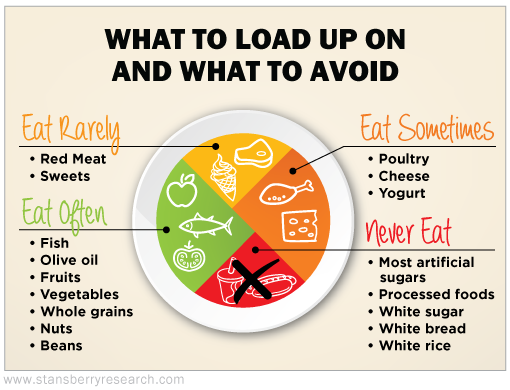It's January. And if you're like most Americans, you've probably launched into some new fad diet to try to shed those extra pounds.
Longtime readers know I hate diets, particularly fad diets that cause more harm than good. They're too hard to follow and once you drop off, you pack any lost pounds right back on.
But there's one diet I do support...
The Mediterranean diet.
[optin_form id="73"]
This year, U.S. News & World Report gave the Mediterranean diet the No. 1 spot on its list of best diets. It earned top marks for being the best for diabetes and the easiest for folks to follow.
We've written many times about the benefits of the Mediterranean diet. Thanks to an emphasis on fish, lean protein, fruits, vegetables, and olive oil, it packs in the best nutrients you can get.
Remember, olive oil contains significant amounts of antioxidants and monounsaturated fatty acids (“MUFAs”). MUFAs keep insulin levels in check, making olive oil good for diabetics. They also help with cholesterol levels.
Moreover, due to its chemical structure and function, olive oil also protects your cells from oxidation damage. Thus, olive oil reduces the risk of developing diseases of inflammation. That includes heart disease, arthritis, and high blood pressure.
Fish also contains these MUFAs. Fish has polyunsaturated fats, which include omega fatty acids. These acids reduce inflammation and promote brain health. They also keep your bones healthy and your metabolism on track.
And since fish oil pills may contain higher levels of toxins, I try to eat fish instead. I prefer to eat fish that are lower in mercury... like salmon, light tuna, herring, mackerel, and anchovies.
I always recommend fruits and vegetables for a healthy diet. About 10 servings a day is ideal for lowering your risk of cancer and premature death. Even just two and a half servings provides some benefit, but the more the better.
We've also seen how the Mediterranean diet protects against cognitive decline. What's more, a study in monkeys showed that following the diet improved good gut bacteria. Remember, our guts contain trillions of bacteria that regulate everything from digestion to our immune systems.
And finally, a Greek study published last year also found adherence to the Mediterranean diet reduced the number of cardiac events for 10 years.
Like we said, the Mediterranean is one of the easiest diets to follow. A simple day could include fruit and yogurt for breakfast, a nice salad with nuts and an olive oil dressing for lunch, and beans and fish for dinner. Check out this table to see what to load up on and what to avoid...

There's plenty of flexibility with this diet. The key, of course, is to avoid inflammation-triggering foods. Inflammation is the root of so many medical problems, including heart disease and diabetes. These foods include artificial sugar, processed foods, and the white killers (white sugar, white bread, and white rice).
Artificial sweeteners trigger inflammation and may contribute to diabetes. The only sugar replacement we like is stevia, which is a natural, plant-based sweetener. But it may interfere with blood pressure, so we don't recommend using it if you're on blood-pressure medicine.
We know following diets can be tricky. So even if you fall off your diet this year, making small changes that get you closer to the Mediterranean diet will still help keep you healthy. Above all, cut out the inflammation-causers. You'll have a better 2019 as a result.
What We're Reading...
- Something different: Why spend six figures a year to track wolves?
Here's to our health, wealth, and a great retirement,
Dr. David Eifrig and the Health & Wealth Bulletin Research Team
January 10, 2019
